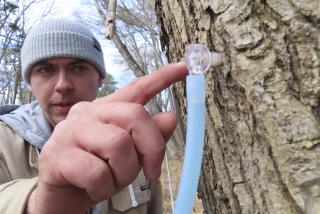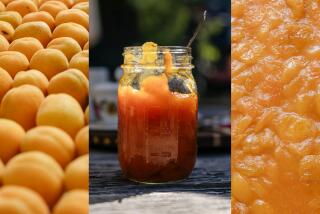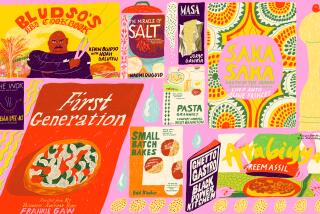Sugarcoat It
- Share via
I find myself missing my native Vermont twice a year: once in the fall, when the maple trees go out in a blaze of colorful glory, and again in the spring when the cool nights and warm days mean one thing--maple syrup season. This is roughly the equivalent to peach season down south, but with four to six weeks of maple-mania: maple-butter carrots, maple-glazed ribs, maple cornbread, maple mousse, maple milkshakes and even the occasional maple hot dog.
It started when my parents bought 13 acres in rural Sandgate that included a sap house among its outbuildings. Of pragmatic German stock, my father decreed that since it was there, we’d use it to make syrup.
He tapped about 20 trees that dotted our property. Each day after school, I pulled a toboggan through the melting snow from tree to tree, my younger sister Sue balancing a galvanized metal garbage can on the back of the toboggan. My older brother Al would empty the buckets filled with the watery looking sap.
At the end of each run, Al and I hauled the toboggan-load back to the sap house, straining and heaving as my sister steadied the overflowing garbage can and did her 8-year-old best to avoid being crushed to death by it.
Contrary to the quaint pictures on syrup cans of snow-covered log cabins with smoke curling out of the chimney, our wooden shack of a sap house was more reminiscent of an outhouse. Inside was a long concrete-block fire pit topped with a four-foot-wide copper pan. This was where the gallons of sap began their slow boil down to syrup, a monthlong maple-scented bonfire that would slowly turn 40 gallons of sap into a gallon of the finished product.
My brother and I were often stationed in the sap house late into the night, waiting until the sap had boiled down to about half and started to foam slightly. Then we’d pour it off and take it back inside to finish the process. Sometimes, to alleviate boredom and hunger during those six- or seven-hour boiling sessions, we’d throw hot dogs into the sap and clandestinely snack on them.
Although no one else in the family went as far as my brother and I in pursuit of the outer bounds of maple flavor, each season seemed to bring with it at least one new maple-based dish, such as fudge, baked beans or pork roast passed along by other sugaring veterans to help utilize excess syrup.
When the season finally drew to a close, the three of us kids would come down from our sugar highs and resolutely swear off anything that tasted of maple, reminded us of maple or that could even be rearranged to spell the word “maple.” But, sure enough, the following year we’d be ready to do it all again.
The sap house is long gone now--victim of a rerouted driveway. Some of the trees are gone, and those three kids are all grown up. Luckily, almost 30 years later, the memories and the flavors of those days in the maple trade are as a close as my stove, my refrigerator and a bottle of Grade A Amber.
*
Maple-Mustard Cornish Game Hen
(Recipe by Jeff Respress)
Serves 2
2 Cornish game hens
6 tablespoons grade-A medium amber maple syrup
3 tablespoons dark brown sugar
6 tablespoons butter (salted or unsalted)
5 tablespoons spicy Dijon Mustard
3 teaspoons thyme (dried and crumbled)
2 teaspoons sage
Salt and pepper
Preheat oven to 375 degrees. Combine maple syrup, brown sugar, butter, Dijon mustard, thyme and sage in a small saucepan. Cook over low heat, stirring constantly until butter melts. Remove from heat. Cool to room temperature.
Wash and pat dry hens. Tie hen legs. Place hens in nonmetal dish. Pour most of the maple syrup-mustard glaze over the hens, reserving remaining amount for serving. Cover marinating hens and refrigerate for 2-4 hours.
Place hens in baking pan and brush them with glaze from marinade dish. Salt and pepper to taste over top of glazed hens. Roast uncovered for about 60 minutes, brushing hens every 20 minutes, until juices from thigh are clear.
*
Adam Tschorn last wrote for the magazine about the ritual of shaving.
More to Read
Sign up for The Wild
We’ll help you find the best places to hike, bike and run, as well as the perfect silent spots for meditation and yoga.
You may occasionally receive promotional content from the Los Angeles Times.







